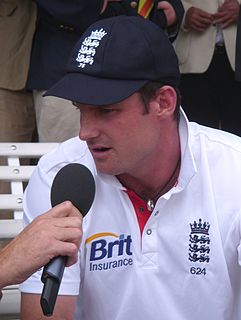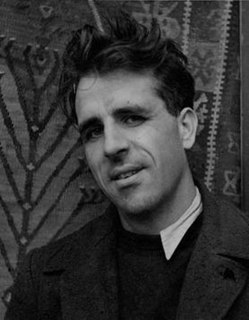A Quote by James M Strock
Theodore Roosevelt regarded leadership as his one gift, the area in which he might be considered to possess genius. He presented his views on leadership throughout his voluminous writings. He intended for future writers to study them with an eye toward action, as he himself had done of historic figures.
Related Quotes
A man of genuine literary genius, since he possesses a temperament whose susceptibilities are of wider area than those of any other, is inevitably of all people the one most variously affected by his surroundings. And it is he, in consequence, who of all people most faithfully and compactly exhibits the impress of his times and his times' tendencies, not merely in his writings where it conceivably might be just predetermined affectation but in his personality.
He knew that he was the stuff of which fanatics and madmen are made and that he had turned his destiny as if with his bare will. He kept himself upright on a very narrow line between madness and emptiness and when the time came for him to lose his balance he intended to lurch toward emptiness and fall on the side of his choice.
When he at least reached the door the handle had cease to vibrate. Lowering himself suddenly to his knees he placed his head and the vagaries of his left eye (which was for ever trying to dash up and down the vertical surface of the door), he was able by dint of concentration to observe, within three inches of his keyholed eye, an eye which was not his, being not only of a different colour to his own iron marble, but being, which is more convincing, on the other side of the door.
What becomes decisive to a Justice's functioning on the Court in the large area within which his individuality moves is his general attitude toward law, the habits of the mind that he has formed or is capable of unforming, his capacity for detachment, his temperament or training for putting his passion behind his judgment instead of in front of it. The attitudes and qualities which I am groping to characterize are ingredients of what compendiously might be called dominating humility.
I often ask myself: "What would Theodore Roosevelt do?" One can never know, of course. The ultimate contribution of consequential leaders is often their capacity to reframe issues in novel ways. That said, his leadership engaged, at a foundational level, whether the American "national character" would accept decline and mediocrity, or would go all-in for leadership and excellence. Amid the myriad of otherwise disconnected issues before us, that choice is emerging yet again.
Whoever has not arrived at the clear insight that there might be greatness entirely outside his own sphere for which he has no understanding, whoever does not have at least a dim inkling in which area of the human spirit this greatness might be situated: he is within his own sphere either without genius, or he has not educated himself up to the point of the classical attitude.
The face of the Son of God, who, instead of accepting the sacrifice of one of his creatures to satisfy his justice or support his dignity, gave himself utterly unto them, and therein to the Father by doing his lovely will; who suffered unto the death, not that men might not suffer, but that their suffering might be like his, and lead them up to his perfection.




























